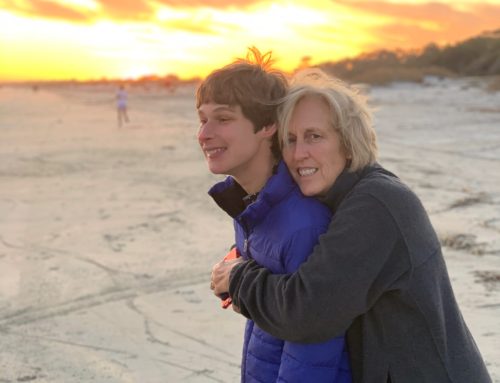When we started our ministry to couples raising a child with special needs, our desire was to share truths or helpful ideas that we wished someone had shared with us when we were new to parenting. A lot of the concepts are similar to advice given to couples that are raising children without a disability, but we think a few are unique to us raising a child with a disability. One principle that really helped us, was to try to discipline ourselves to focus on the “here and now.” Although “taking one day at a time” may sound like a cliché, we do think that there is a lot of wisdom in that advice.
When your children are young, you are bombarded with advice from teachers, therapists (occupational, speech, physical, respiratory), nurses and doctors. That in itself can be challenging. Add to it that you may also be saying to yourself “and I’m going to have to do this for the next 30 years!” truly makes it all seem overwhelming!
Mary at age 32, is considered non-verbal, in a brief at night and has periodic incontinence accidents during the day. When Mary was younger, the thought of having to try to decipher her needs or take care of her personal hygiene needs for the next 30 or 40 years was indeed overwhelming. We remember making a conscious choice to not let our minds or our language go there. We would try to change in our mind what we were asking ourselves to do. We tried to ask ourselves, “can I do it today?” or “can I do it for a week?”, as opposed to, “can I do this for 30 years?” It was a simple change, but one that we found helpful. Because when you see something as overwhelming (which we believe the prospect of changing a child’s diaper or G-tube for 30 years can be), you stop trying. The weight of it can be too great. We encourage you to try to train your mind to NOT look at those difficult daily tasks as something you will need to do for 20+ years.
We are not saying that you don’t plan for your child’s future. You should. For example, one area that we recommend you plan for and discuss years before your child turns 21, is what your child will do when he/she leaves the educational system at age 21. Services and funding change when a child reaches 21. Help is out there, but you have to find it as opposed to a teacher or school coming to you. (This is probably a topic for another blog.) Planning is important but worrying about daily things in terms of years is too much and unnecessary. Elizabeth Eliot once told me (yes, I (Laurie) met her!) “God gives grace for the moment, but not for our imagination.” We think this is good advice to remember, especially at those moments our mind goes to the future.
So here we are 32 years later, still unable to dialogue with Mary and still cleaning up occasional accidents … still not easy; but relying on God’s grace to address it (and more importantly, knowing God’s grace is sufficient) … one day at a time.







Thank you for reminding me to live in the moment and ask God for his grace for today. One Day at a Time! And, WOW, on really meeting Elizabeth Elliot 😁
This is wise advice. Re-training the mind is what I needed to hear. That, and not sinking into irritation/despair in the moment.
Such a beautiful message and shared in such a loving and helpful way! I know that God’s grace is sufficient but the hopeful reminder that we only have to take one day at a time encourages me to press on with the assurance that God will be with me tomorrow and every day thereafter. Thank you, Laurie, for you open and honest approach and willingness to share from the heart.